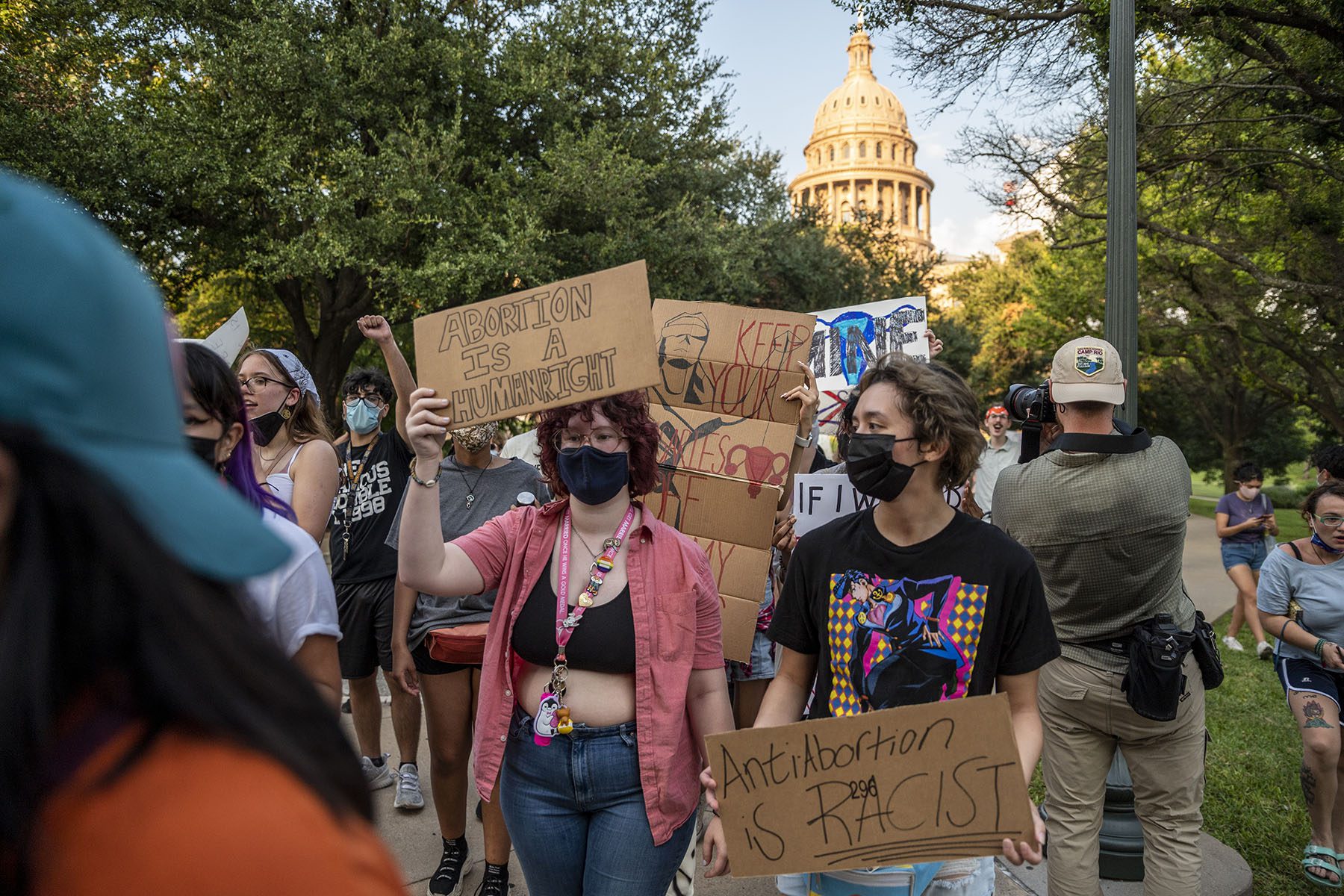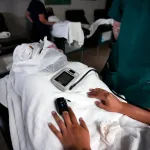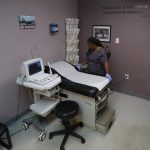Marva Sadler is not used to telling patients “no.” Since Senate Bill 8, Texas’ six-week abortion ban, took effect, she now feels like she’s saying it all day.
Sadler is the director of clinical services at Whole Woman’s Health in Fort Worth. When patients arrive at the clinic, she said, they are aware of the realities of the new law: Abortion past six weeks is now illegal, with no exceptions for rape and incest. Still, they can hardly process that there’s little the clinic can do to help them.
“We’re seeing shock. Absolute shock,” Sadler said. “They know the law but don’t expect to hear from us that there are no other options other than leaving the state.”
As streams of patients continue to show up seeking procedures they can no longer receive, abortion clinics in Texas have become more like trauma centers — places where people are coming in severe emotional crisis.
“There is anger, fear and sadness,” Sadler said. Being there to help patients process these feelings is not easy work, Sadler said, calling it a “wear on anyone’s mental stability.”
For patients they can’t treat, clinic staff offer to schedule appointments with providers out of state. To date, not a single patient at Whole Woman’s Health in Fort Worth has taken them up on it. Most are taken aback by the offer, Sadler said. They’ve already had to take time off of work, find child care and transportation, even leave meals for family at home just to make it through the door at her clinic.
“It’s not just the financial piece, but about jumping up and leaving home without having the time or expectation to plan,” she said. “100 percent of our patients have left here with an ‘I don’t know what’s next for me.’ They’re leaving the clinic without a plan because there are no plans.”
While Sadler emphasized that SB 8 has been especially hard on low-income people and people of color, she is also concerned about their patients who are minors, like a 17-year-old who had just learned on August 30 that she was 13 weeks pregnant, which she told Sadler was a result of rape by a close family friend. When she called on September 1, the day the law went into effect, there was no longer anything the clinic could do to help her.
“I felt so horrible for her,” Sadler said. “What we could recommend and refer her to is so limited.”
Doris Dixon, the director of patient access at Planned Parenthood Gulf Coast in Houston, said the days preceding and following SB 8 taking effect have “been nothing short of an emotional rollercoaster.”
Dixon said she and her colleagues have gone from being people who help schedule health care appointments to staffers at “a crisis center.” They’re providing emotional support, referrals and logistics in lieu of actual abortion services.
“[I’m] thinking about how we can provide resources, financial resources, get patients out of state just to get care,” Dixon said. “That’s where I’m at right now. I just try not to cry. It’s really, really hard sometimes.”
I felt so horrible for her. What we could recommend and refer her to is so limited.
Marva Sadler, the director of clinical services at Whole Woman’s Health in Fort Worth, after speaking to a pregnant 17-year-old who was raped by a family friend.
Within 24 hours of SB 8’s passage, Dixon encountered a patient who was past six weeks pregnant and in need of a very specific kind of abortion as a result of scarring from a previous Cesarean section. It was a procedure that on August 31 could have been safely and easily performed at Planned Parenthood Gulf Coast. But when the patient came to the clinic on September 2, the day after SB 8 went into effect, she learned she would now need to seek care in another state. Planned Parenthood Gulf Coast staffers ultimately found a doctor in New Mexico, relying on a community of providers across the country that have banded together to figure out how to best get patients treated across state lines.
But locating a qualified provider was only part of the solution.
“She had two children and no day care,” Dixon said. “Her sister was trying to figure out how to take off from her job to drive her, because the patient had never been on a plane before and is terrified to fly.”
Dixon said after helping the patient, she cried for 30 minutes straight.
Another patient Dixon spoke with found out she was pregnant the day SB 8 became law. That same day, she also found out she had tested positive for COVID-19, meaning no provider could see her for an abortion for another 14 days. In that time period, the woman exceeded six weeks of pregnancy, and Dixon had to counsel the patient that she would have to go out of state for her procedure.
Tonya Capson, the regional director of Planned Parenthood of Greater Texas, who oversees clinics in the Austin and Waco areas, is also grappling with the ways that SB 8 has changed the nature of her work and her patients’ lives. Previously, her clinics only saw patients by appointment. Now, they’re taking walk-ins for ultrasounds that determine gestational age: Patients need to know, urgently, whether they still legally qualify for an abortion.
During a recent week, Capson said 40 percent of the patients in her clinics had signs of cardiac activity on their ultrasound, meaning they no longer qualified for abortions. Some of those patients were referred to clinics in other states where they could legally access abortion. Others were “so upset that they don’t even know what to choose at this time.” Capson said she spoke with one patient who had just started a new job, and taking time off work to travel to New Mexico or Oklahoma to get an abortion simply wasn’t an option.
“She said she would lose her job if she took off more time,” Capson said. “She already had to take time off just for this appointment. It’s very disheartening to have to deal with how upset patients are when they can’t get the services they need and want.”
Capson said while most patients she has seen personally are aware of SB 8, they don’t realize how small of a window they actually have. The six-week ban is really more like two weeks; most people don’t realize they’re pregnant until they miss a period. She also said many of the patients she has personally seen are less than six weeks gestational age but still show cardiac activity on their ultrasound.
“What’s most difficult for patients is they feel like they’re reaching out and seeking services in a timely manner, but the window is too small,” she said. “They’re devastated.”
For many patients, the thought of being forced to continue a pregnancy is simply too much to bear. The same week SB 8 went into effect, Capson counseled a patient who was a recent immigrant to the United States and was not an English speaker. The patient had no awareness of SB 8 at all and had several small children at home, telling Capson about the financial hardships she would face if she had another child. She was already getting as much assistance from the government as she could. One more child to feed and care for would be the tipping point for her family.
“We had to tell her that in the state of Texas, she couldn’t get an abortion because we saw cardiac activity,” Capson said.
She’s hardly alone: Plaintiffs who have sued the state to block SB 8 estimate the law has ended between 85 and 90 percent of all abortions in the state, as a result of how few abortions take place before six weeks of gestation. When it comes to providing abortions, clinics’ options are limited, if not non-existent.
“I have the equipment and medications and staff and providers,” Sadler said, “but now that’s all just collecting dust.”
Disclosure: Planned Parenthood has been a corporate sponsor of The 19th.







